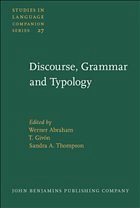Nicht lieferbar

Discourse, Grammar and Typology
Papers in honor of John W.M. Verhaar
Versandkostenfrei!
Nicht lieferbar
Main description:This volume combines papers selected for their affinity with work on discourse analysis and language typology. The methodological platform is the authors' conviction that all linguistic work needs to be empirical in the sense that generalizations are to be made on the basis of spoken texts in larger contexts, generalizations are correct only as long as pertinent linguistic material does not contradict them, and that linguistic categories and rules are of a temporal nature. In this sense, the contributions represent 'functional typological' comparison, often of languages not fr...
Main description:
This volume combines papers selected for their affinity with work on discourse analysis and language typology. The methodological platform is the authors' conviction that all linguistic work needs to be empirical in the sense that generalizations are to be made on the basis of spoken texts in larger contexts, generalizations are correct only as long as pertinent linguistic material does not contradict them, and that linguistic categories and rules are of a temporal nature. In this sense, the contributions represent 'functional typological' comparison, often of languages not frequently investigated.
The papers are arranged in 5 groups: Transitivity and voice; Clausal modality; Typology and discourse categories; Language and Culture; Functionality.
Table of contents:
- Introduction
- Curriculum vitae
- List of publications
- Section I: Transitivity and voice
- Diathesis
- How many Transitivisers are in Kope?
- Complement Clauses versus Relative Clauses
- The two Prototypes of Ditransitive Verbs
- Section II: Clausal modality
- The Assertion of High Subjective Certainty
- On the German werden Future
- The Category 6;Event' in Natural Discourse and Logic
- Section III: Typology and discourse categories
- The Category 6;S' in English Conversation
- A Semantic Basis for Grammatical Typology
- Section IV: Language and culture
- Grammatical Signs of the Divided Self
- Language and Culture of Inner Asia's Borderland
- Section V: Functionality
- Multifunctionality and the Realization Problem in Modelling Discourse Production
- Towards an Understanding of Linguistic Evolution and the Notion 6;X has a Function Y'
- 'Lice he no good'
- Form and Meaning in Morphology
- Subject Index
- List of contributors and their academic affiliations
This volume combines papers selected for their affinity with work on discourse analysis and language typology. The methodological platform is the authors' conviction that all linguistic work needs to be empirical in the sense that generalizations are to be made on the basis of spoken texts in larger contexts, generalizations are correct only as long as pertinent linguistic material does not contradict them, and that linguistic categories and rules are of a temporal nature. In this sense, the contributions represent 'functional typological' comparison, often of languages not frequently investigated.
The papers are arranged in 5 groups: Transitivity and voice; Clausal modality; Typology and discourse categories; Language and Culture; Functionality.
Table of contents:
- Introduction
- Curriculum vitae
- List of publications
- Section I: Transitivity and voice
- Diathesis
- How many Transitivisers are in Kope?
- Complement Clauses versus Relative Clauses
- The two Prototypes of Ditransitive Verbs
- Section II: Clausal modality
- The Assertion of High Subjective Certainty
- On the German werden Future
- The Category 6;Event' in Natural Discourse and Logic
- Section III: Typology and discourse categories
- The Category 6;S' in English Conversation
- A Semantic Basis for Grammatical Typology
- Section IV: Language and culture
- Grammatical Signs of the Divided Self
- Language and Culture of Inner Asia's Borderland
- Section V: Functionality
- Multifunctionality and the Realization Problem in Modelling Discourse Production
- Towards an Understanding of Linguistic Evolution and the Notion 6;X has a Function Y'
- 'Lice he no good'
- Form and Meaning in Morphology
- Subject Index
- List of contributors and their academic affiliations




